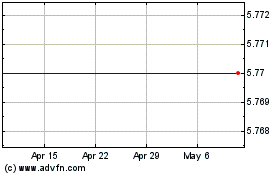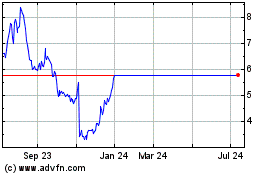Few Rivals Speak Out Against Sprint, T-Mobile Merger
August 28 2018 - 3:26PM
Dow Jones News
By Drew FitzGerald
WASHINGTON -- If America's tech and telecom giants have an
opinion about T-Mobile US Inc.'s plan to reshape the wireless
industry by taking over Sprint Corp., most are keeping it to
themselves.
Few large companies have gone on record to back or oppose the
roughly $26 billion merger, which would combine the country's No. 3
and No. 4 carriers. Fewer still are using their lobbying prowess to
fight the deal behind the scenes, people familiar with the matter
said.
"I don't think you're going to have any entity that has motive
and means to oppose this deal" among big business, said Blair
Levin, an industry analyst at New Street Research LLC. A lack of
organized opposition favors the companies as they seek approval
from the Federal Communications Commission and U.S. Department of
Justice to close the deal.
The FCC deadline for opponents to make petitions to deny the
transaction passed Monday, and many groups waited until the last
minute to file. Representatives of Sprint and T-Mobile have met
with FCC and Justice Department lawyers several times to sell the
deal and don't expect to be able to close it until next year,
according to people familiar with the meetings.
Dish Network Corp., the satellite-TV provider that also controls
swaths of spectrum that could be used for cellphone services, threw
its weight against the deal. The company said in a filing the move
would drive up prices, citing analysis from its own economists and
consultants.
"Sprint and T-Mobile's strength as independent companies comes
from their efforts to attract and retain customers by competing
head-to-head, " Dish wrote to the FCC.
Other companies are taking a middle road. AT&T Inc. said in
an FCC filing that it wouldn't opine on whether the agency should
approve the deal, though it defended its own network upgrade plans
and said the "rush to deploy the best 5G service the fastest will
continue with or without the T-Mobile/Sprint merger."
In a joint statement, the merger partners said, "We are
confident that the merger of Sprint and T-Mobile will create more
competition and will be incredibly positive for consumers. These
filings are part of the normal FCC open comment process."
Major cable companies, some of which held deal talks with Sprint
before it fell into T-Mobile's arms, have remained neutral. Comcast
Corp. and Charter Communications Inc. both offer wireless service
that runs atop Verizon's network, yet neither has taken a position
on the latest wireless deal.
Rivals and potential partners have several strategic and
political reasons for holding their fire, Mr. Levin said. Wireless
and cable companies tend to avoid making statements about
competition that could come back to hurt them when they seek
regulators' approval for their own transactions. The same goes for
big tech companies that are often at odds with the telecom industry
but are facing increased scrutiny of their power over various
markets.
Neutrality is hardly a given in the wireless industry. Sprint
sued in 2011 to stop AT&T from buying T-Mobile, a deal that
ultimately fell apart amid opposition from the Obama
administration. A range of companies lined up to fight Comcast's
2014 attempt to buy rival Time Warner Cable Inc. Charter ended up
buying most of Time Warner instead.
In the case of Sprint and T-Mobile, several public interest
groups asked the FCC to delay its review process, a request the
agency denied. The Rural Wireless Association urged the commission
to reject the deal and warned that its members would lose the
beneficial roaming relationships they have with Sprint.
The industry's largest labor union, the Communications Workers
of America, opposes the deal and warned in its filing the
transaction would nix about 24,000 jobs at overlapping stores and
cut another 4,500 headquarters positions. Employees at Sprint and
T-Mobile don't belong to any unions.
Both Sprint and T-Mobile have promised to add more jobs than
they cut, mostly by beefing up staffing at customer-support
centers.
State officials are split on the deal. Attorneys general in
California and New York told the FCC they are investigating the
transaction, which is often a first step toward filing a lawsuit to
block a deal or join a federal effort against it. State AGs in Utah
and New Mexico wrote the FCC to support the deal, however.
Several prepaid wireless brands that run atop the big carriers'
networks could be constrained by the deal. Many have avoided
speaking about the deal to avoid antagonizing two companies they
must do business with even as they compete, according to Boost
Mobile founder Peter Adderton, who is urging T-Mobile and Sprint to
divest some of their prepaid operations.
Prepaid brands without network assets of their own are unlikely
to make noise, Mr. Adderton said, adding that taking a public
stance would be like telling "a prison warden what you think of
your prison, and you've got five years left on your sentence."
Write to Drew FitzGerald at andrew.fitzgerald@wsj.com
(END) Dow Jones Newswires
August 28, 2018 15:11 ET (19:11 GMT)
Copyright (c) 2018 Dow Jones & Company, Inc.
DISH Network (NASDAQ:DISH)
Historical Stock Chart
From Mar 2024 to Apr 2024

DISH Network (NASDAQ:DISH)
Historical Stock Chart
From Apr 2023 to Apr 2024
